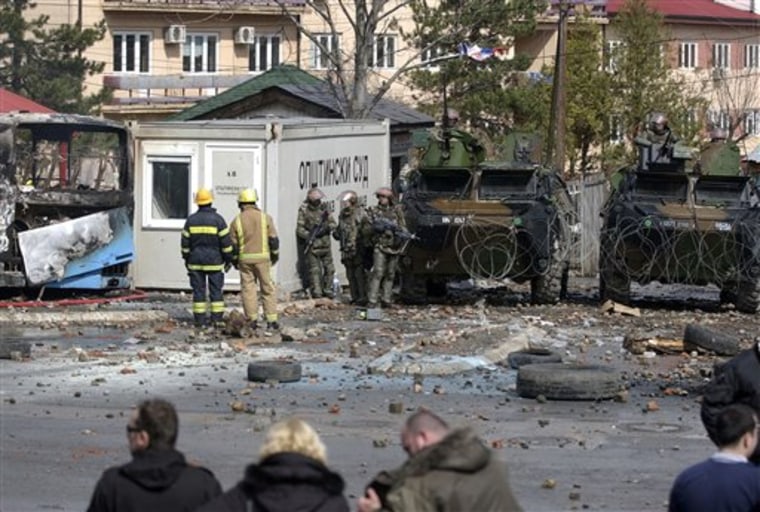International forces pulling Serb demonstrators from a U.N. courthouse were attacked Monday by hundreds of furious protesters who massed outside, setting off an hours-long battle with rocks, grenades and live ammunition.
U.N. and NATO forces responded with tear gas, stun grenades and gunshots. At least 42 U.N. and NATO forces and 70 protesters were wounded in the worst violence in Kosovo since its declaration of independence last month.
The U.N. police stormed the courthouse just before dawn to arrest dozens of Serbs who had occupied the U.N. building since Friday to protest Kosovo’s declaration of independence from Serbia.
Hundreds of Serbs surrounded the courthouse as the police tried to leave with the arrested demonstrators. Polish, Ukrainian and Bulgarian members of the U.N. force and NATO troops backing them up were pelted with rocks, Molotov cocktails and hand grenades. Some demonstrators fired guns at the international forces. Witnesses said others surrounded and attacked three U.N. vehicles, pulling out and freeing about 20 of the 53 protesters who had been arrested in the courthouse. The rest of the 53 were freed after questioning.
At least one U.N. vehicle and one NATO truck were set ablaze.
Danish military police said they exchanged fire with protesters as they helped evacuate wounded fellow officers.
“The motorcade came under fire and fired back,” Steen Nielsen, a spokesman for Denmark’s 300 troops in Kosovo. “No Danish troops were injured.”
U.N. police pull out
The clashes ended by noon, but hundreds of U.N. police decided to pull out of northern Mitrovica after coming under small-arms fire in the Serb-controlled part of the city. The officers retreated, leaving NATO troops to try to restore order.
Alexander Ivanko, spokesman for the U.N. mission in Kosovo, said U.N. staff in Kosovska Mitrovica “have been ordered to relocate” to the regional headquarters in the southern part of the town.
The town is divided between Kosovo’s ethnic Albanian majority and the Serb minority, which fiercely opposed the declaration of independence and is furious over Western support for it.
Machine-gun bursts could be heard until midday, although it was not clear who was firing. NATO helicopters hovered above the town.
The protesters have been trying to take control of local institutions that have been run by the U.N. since the end of the war in Kosovo in 1999. Crowds had gathered daily at the courthouse to prevent international and ethnic Albanian judges from returning to work there.
NATO and the U.N. condemned “lethal violence, including direct fire by a mob.” Serbian President Boris Tadic accused the international forces in Kosovo of “using excessive force,” and warned of “escalation of clashes in the entire territory” of Kosovo.
Serbia tries to draw Russia in
In Mitrovica, Serbia’s government minister for Kosovo, Slobodan Samardzic, described the action by U.N. police as “brutal and inadmissible.” Serbia’s Prime Minister Vojislav Kostunica said consultations were under way with ally Russia to plot a joint response. He urged the U.N. Security Council to take “necessary steps” to restore security in Kosovo.
Tadic urged the U.N. and NATO to refrain from using force and called on the Serbs not to provoke the international forces. The European Union expressed concern about the violence and called for restraint.
French military officials said about 20 of its soldiers were injured. One of the French soldiers suffered head wounds after the explosion of a Molotov cocktail, though none of the French troops had serious injuries, the said. Poland said 26 of its police officers were injured and Ukraine said 15 of its peacekeepers were hurt.
“Most of the civilians suffered injuries from shock bombs, tear gas and explosive devices,” said Vladimir Adzic, the head of a nearby hospital. One was struck in the eye by a bullet, hospital officials said.
In the Serbian capital, Belgrade, police deployed in front of government buildings and Western embassies, apparently fearing that rioting could erupt as it did in the days after Kosovo’s declaration of independence on Feb. 17. Several thousand nationalists rallied downtown carrying Serbian flags and chanting “Kosovo is Serbia!”
Predominantly ethnic Albanian Kosovo has been under U.N. control since 1999, when NATO launched an air war to stop Slobodan Milosevic’s crackdown on ethnic Albanian separatists.
Serbia, which considers the territory its historic and religious heartland, says Kosovo’s declaration of independence is illegal under international law.
